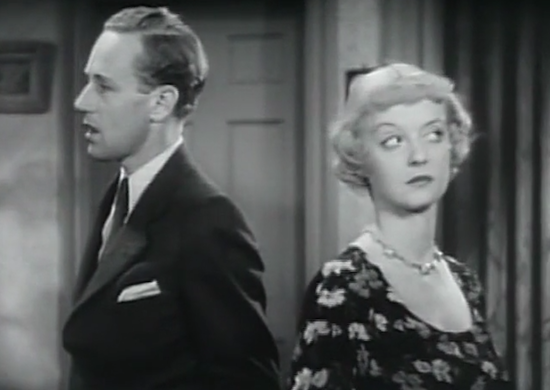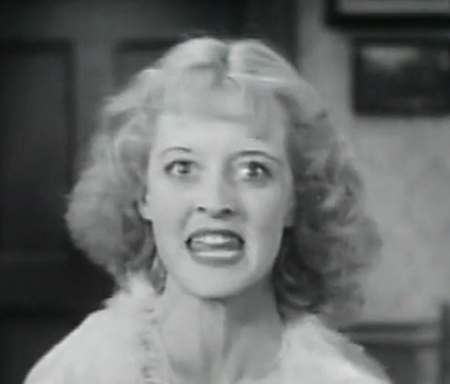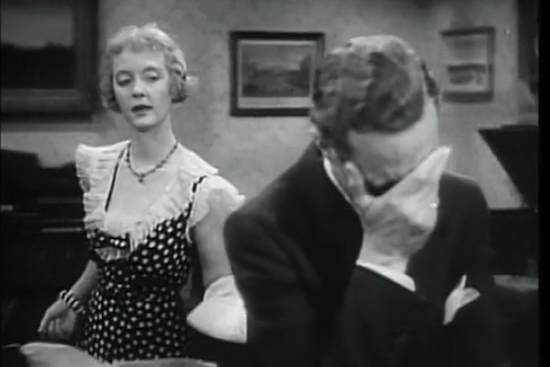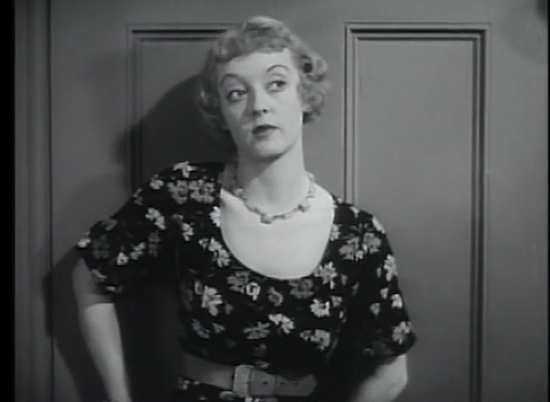
I read Of Human Bondage as a preteen/teen and was moved by the story of a would-be artist who eventually discovered that a simpler life of helping others was his route to happiness. As a wannabe artist myself, Philip’s journey was meaningful, even enlightening. His time practicing medicine for a poor community won the respect of his patients and his gruff superior—even crushed the snootiness that had marred the rest of his life. While Philip’s extreme sensitivity (related to his club foot) was what drew me as an angsty young girl, it wasn’t his only trait. He was funny, self-aware, compassionate—a fully rounded character.
What Hollywood would do to William Somerset Maugham’s reflective character I had a right to fear, especially since the 1934 version was known as Bette Davis’s breakout role. She played the extremely unlikable Mildred, a mean-spirited waitress who detours Philip on his journey. Mildred traps him in his lust for her, but never pretends to like or be faithful to him. She sucks away his time, energy, and money, and he’s too weak to resist.
She is, in short, one of Maugham’s complex female characters: fascinating, headstrong, real—the kind of role actresses are craving now, almost a hundred years later. And with an ambitious young Davis at the helm, sick of her milksop roles and ready for something meaty, what chance did Leslie Howard have for any attention (his starring role notwithstanding)?
No one can stand up to Davis in full chewing-the-scenery mode.

She doesn’t nail the accent, but Davis does fully personify this selfish woman, particularly her flirtatious nature and prickly pride. She shows how Mildred’s self-interest–her primary trait–can’t stand up to her destructive passions. Except for her trademark burning magnetism, Davis is nearly unrecognizable in the role: she BECOMES Mildred.

She famously only got a write-in nomination that year, but won the Oscar the next, most say in compensation for the MIldred loss. Bette’s (Cockney?) accent is regrettable, but everything else about her characterization is perfect.
I’m not sure if writer Lester Cohen decided the movie would be the Philip-Mildred show, given that part of the book’s high drama, or if director John Cromwell saw what he had in Davis and switched it accordingly. But poor Philip’s spiritual journey is reduced to a few scenes, with conversations with Mildred and his later love Sally (Frances Dee) meant to explain his transformation.
Basically, fans of the book can enjoy the fine sensitivity of Philip on screen, which Howard carries off. But Philip’s growing devotion to his career is off the screen. Somerset Maugham was a genius at empathy, and his semi-autobiographical masterpiece shows how Philip’s extreme sensitivity, such a burden as a child, led to his success and happiness as a humble doctor (just as Maugham’s sensitivity to his stutter may have made him a great writer). That theme is totally lost in the don’t-date-women-like-Mildred messaging of the film.
So as far as capturing the book, this film fails. But the movie does nail William Somerset Maugham’s trend of giving female characters their due. I’ve written before about how frequently actresses in his stories are nominated for (and often win) Oscars once his films are screened—including Annette Bening, who should have won for Being Julia.
Look at Davis: wins her Oscar for Dangerous because of her performance as Mildred, then gets nominated for The Letter, another of Maugham’s most famous stories, just six years later.
If that isn’t an advertisement for the continual reading of William Somerset Maugham’s body of work, I don’t know what is. And that–in my eyes–is what makes for a successful film adaptation.
Check out Silver Screen Classics‘s Classic Literature on Film blogathon for more adaptations of your favorite books!


While I have no doubt that Bette Davis was impressive in this role, it’s hard to imagine Leslie Howard standing out in ANY role. Ick.
Annette Bening was AWESOME in Being Julia. But I would have given the Oscar to Imelda Staunton that year. Definitely the worst Oscars of my lifetime, given that Hilary Swank beat them both in the ridiculously overrated and nauseating Million Dollar Baby.
I agree about Million Dollar Baby. An atrocious film. And I haven’t been a huge fan of Howard’s due to his annoying role in Gone with the Wind. It’s a tough call between Staunton and Bening. Both were excellent in those roles, for entirely different reasons. Staunton’s performance was certainly haunting. But it’s rare for me to get a book I didn’t before due to an actress’s portrayal—and Maugham’s Theatre didn’t really resonate for me UNTIL Bening made the main character come alive for me. Now I love both movie and story. So it’s hard for me to compare the performances.
The 2021 Classic Literature On Film Blogathon Is Here – Day Three – Silver Screen Classics
[…] Of Human Bondage (1934): Bette Davis Crushes Leslie Howard – Cary Grant Won’t Eat You […]
I don’t think I’ve seen this film – but anyway, I was brought here through the blogathon and want to say, your blog title/header and it’s mission is great! I’m pretty busy these days but I’d like to find time to have more of a poke around here some time 🙂
Thank you! I appreciate it:) It’s been such a fun blogathon!
I read Of Human Bondage in my late teens, and I remember identifying greatly with Philip. I saw the 1934 movie much later and was rather indifferent about it, perhaps as much due to the economies it takes with Philip’s backstory as with the casting of Howard — he doesn’t seem to have many fans left, does he?. 🙂 I had to chuckle over the full-on scenery chewing screenshot of Davis… yikes!
Apropos of nothing, I just saw Leslie’s son Ronald in an episode of the old TV show One Step Beyond (“true” life tales of the paranormal). Now there is an actor I can appreciate, with roles in the Sherlock Holmes TV series, in Boris Karloff’s Thriller TV show, Alfred Hitchcock Presents, Hammer’s Curse of the Mummy’s Tomb, etc. 🙂
Yes, he’s not my favorite–though I did appreciate the support he gave Humphrey Bogart. I had no idea his son was an actor too! I need to check him out. He certainly looks like his father. And very few things are as scary as Bette Davis when she’s chewing the scenery, right? LOL.